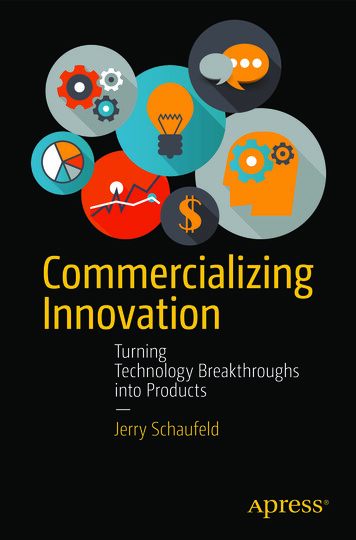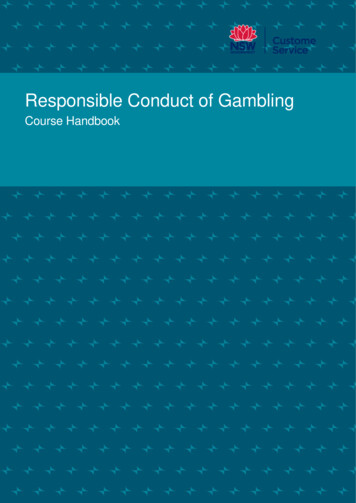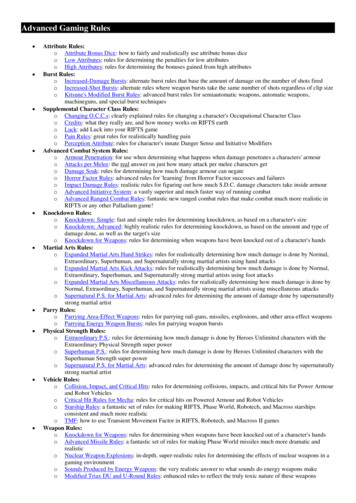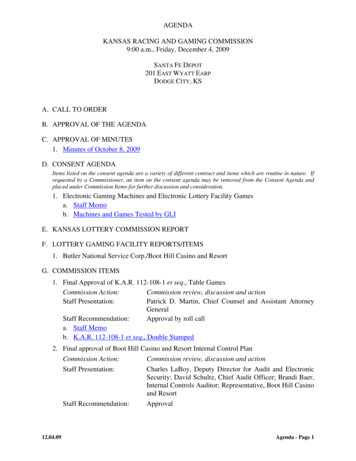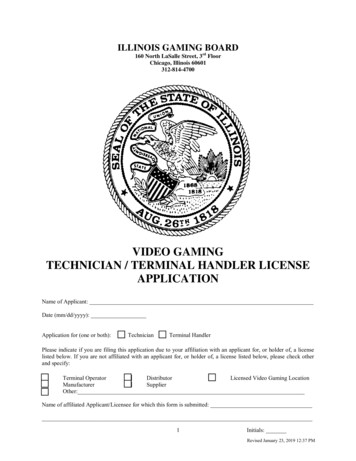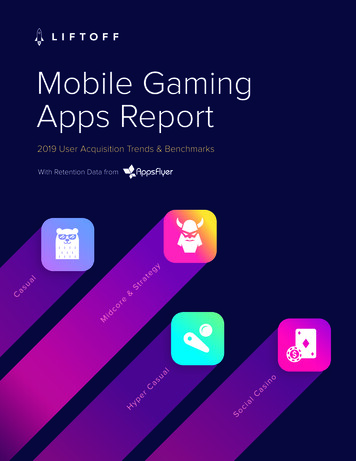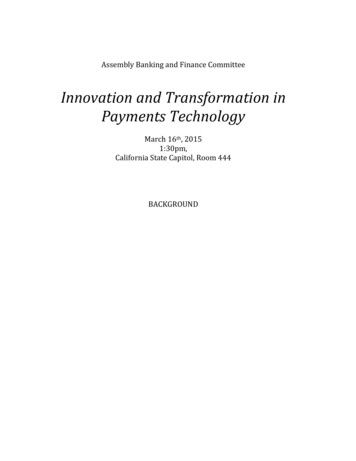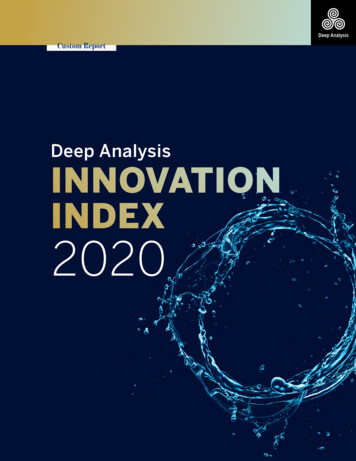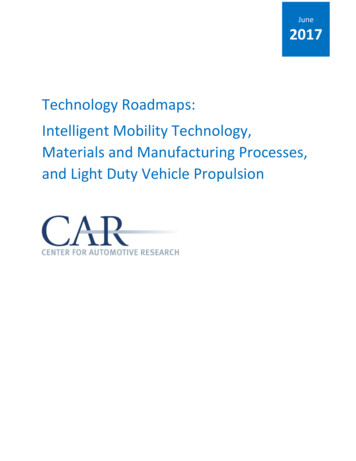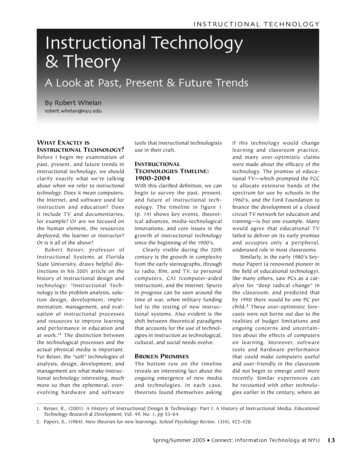
Transcription
Technology Innovation &Gaming2020Materials available at www.gamingtechnologylaw.com 2020 Greg Gemignani – No claim to government or third party works
Page 1Internet GamblingInternet Background InformationThe internet is essentially a world wide connection of electronic devices using acommon basic communications protocols. The common protocols that bind all networkdevices of the internet are the Transmission Control Protocol and Internet Protocol orcollectively the TCP/IP protocol.There are many attributes and components of the TCP/IP protocol, but this textwill only address a few high level attributes of the protocol as background forunderstanding the internet and its relationship to law and gambling laws in particular.First, devices using the TCP/IP protocol are either assigned an IP address.1 The IPaddress is attached to each instance of communication sent and received by a networkeddevice. To route information between addresses, the internet uses a series of devicesknown as routers. Routers keep track of where devices are connected and route trafficfrom router to router to device to complete the communications circuit.The following may illustrate the concepts presented above more clearly:1To see the IP address of your computer when to a local network you can enter the following:For windows machines, run the command line terminal program (CMD). When the command prompt isshown, type in ipconfig. This will cause the PC to list the IP addresses associated with the machine.For Mac users, run the Network Utility application in the Utility Folder of the Applications Folder, your IPaddress will be presented on the Info tab.To see your IP address as reported on the internet, search Google or type in the following address in yourfavorite browser: http://www.raynersoftware.com/my ip.php?all headers TRUE
Page 2The illustration is of a small home network with a laptop, router, desktop andprinter. This is a common home network setup where a person wants to share theirdesktop printer with their laptop computer. The router will issue IP addresses for thelaptop and desktop, then control the flow of information between the two computersusing their issued addresses.The basic model for creating network traffic is the client/server model. In theabove example, the laptop will issue a request to the desktop to print a document. Therouter makes sure that the network traffic flows to the proper device. The devices willsend a series of requests and responses to complete the transaction of printing from thelaptop to the printer attached to the desktop computer.Because the networking protocol is indifferent to the type of device connected tothe network, it is possible to use a network connected printers rather than sharing aprinter connected to a particular PC. Use of such a network printer would be representedby the following illustration:
Page 3The client/server model of network traffic continues as above. However, insteadof the laptop making requests to the desktop, the request will go directly to the printerthat is connected to the router.Though not illustrated above, the router itself has an IP address. If the home userdecided to connect their home network to the internet, the model scales to accommodate.When connecting to the internet, the internet service provider (ISP) will provide the IPaddress for the router via a modem (Cable modem, telephone modem, DLS modem).The ISP will route network traffic between the modem and the internet, and the routerwill route network traffic on the local network. The following illustrates this next step inthe scale of the network:In the example illustration above, the router gets its own IP address from the ISPthen translates IP addresses for traffic between the local network devices and the widerISP network and internet.While this example focused on a home network, the same principles apply to allinternet networking. Devices get addresses and routers route traffic between addresses.
Page 4Networks are part of networks that are connected to other networks in which informationis routed between devices, networks and routers.The breadth of the internet continues to increase as new devices incorporateTCP/IP compatible networking protocols. In addition to traditional computing devices,many other devices such as home game consoles2, cellular phones3, home telephones4, settop movie boxes5 and televisions6 are adding internet network connectivity. The rush to2The Sega Dreamcast, XBOX, XBOX 360, Nintendo Wii and Sony PS3 all incorporate the ability toconnect to the internet and interact with internet devices.3Many 2G and 3G phones such as the Apple iPhone, the T-Mobile G1, Windows Mobile 6 phones andnewer Blackberry devices have the capability to connect to and interact with the internet.4Voice over IP (VoIP) is becoming a common replacement for standard land line service. VoIP services,like those from Vonage, Time Warner, Comcast and Cox use internet protocols and the internet to transmitvoice data and call data.5In 2006, Apple introduced Apple TV to permit the purchase or rental of movies delivered through theinternet. In 2008, Netflix introduced a set top movies on demand box that used internet connectivity toselect and transit movies.6In 2008, LG and Sony introduced televisions that incorporated internet connectivity for showingtelevisions programming data and streaming video from sites such as YouTube and Hulu.
Page 5add more internet connected devices has also led to some bizarre result such as internetconnected refrigerators and other appliances.The Legal TensionBecause the internet as the interconnection of devices and networks using acommon protocol or language, the internet is not itself bound by geographical constraints.It is really a collection of dispersed hardware, software and signals, rather than a physicalobject.On the other hand, laws and regulations are specific to geographically boundareas. City of Las Vegas ordinances apply within the geographic boundaries of the city.Clark County ordinances apply within the geographic boundaries of the county. Nevadastatutes and regulations apply within the geographic boundaries of the state. UnitedStates laws apply within the territory of the country.This fundamental difference in landscape creates significant tension with regardto application of geographic based laws to activities that are not geographically bound.The Significance for GamingMost gaming laws were drafted at a time when physical presence was required toengage in gambling activities other than sports wagering. In the 1960s, when manyfederal gaming statutes were enacted, there was no way to remotely wager on poker,black jack, slots and other forms of gambling. In the 1960s, it would have been sciencefiction to believe that a person sitting in Minnesota could place a wager in a poker gamewith players sitting in California, Canada, Oklahoma, Vermont, and Florida on a tablebeing run from the Kahnawake nation outside of Montreal, Canada.
Page 6In 2009, the occurrence described above seems perfectly plausible.Federal & Online Gaming in The U.S.A.The United States has a federalist system of government, where sovereignty isdivided between the central federal government and the government of the states. Withregard to gaming, most of the legal authority governing theregulation or prohibition of gaming activities resides with thestates. However, the federal government has assertedconcurrent jurisdiction over activities that occur, or canoccur, across state and international boundaries.Because state law is the primary law governing gaming activities, the legal landscape ofregulated and prohibited gambling in the United States is complex. Most states haveunique gambling laws and prohibitions and a body of disparate court opinions that furthercomplicate the analysis of any gaming activity that can or does occur on a national basis.To complicate matters even further, American Indian tribes also have limited sovereigntyover gaming activities that occur within Indian lands. Therefore, certain gamingactivities that are prohibited within a state may still occur on Indian lands within a statebased on tribal sovereignty.Federal LawsFederal laws regarding gaming are generally limited to the following subjects:1. American Indian gaming2. Sports wagering3. Assisting states in enforcing criminal gambling prohibitions that occur ininterstate or foreign commerce4. Interstate horseracing5. State lotteries6. Funds transfers related to online wagering7. The transportation of gaming equipment
Page 7In addition, other laws regarding financial transactions, money laundering, bank fraudand tax evasion are often used to prosecute gambling businesses that violate any of theselaws.For the purposes of the discussion at this meeting we will focus only on theprimary federal laws that are the focus of recent U.S. Department of Justice (“DOJ”)actions and opinions, namely, the Federal Wire Act, the Illegal Gambling Business Actand the Unlawful Internet Gambling Enforcement Act.The Federal Wire ActThe Federal Wire Act is often the most cited U.S. law applicable to online gamingactivities. The Federal Wire Act, along with several other laws, was a part of the 1961federal legislative package designed to cut off those activities that profited organizedcrime and to assist the states in enforcing their gambling laws. The Federal Wire Act,codified as 18 U.S.C. §1084, generally prohibits the use of interstate electroniccommunications facilities for conducting certain forms of gambling. The core elementsof the statute are provided as follows:18 U.S.C. §1084 Transmission of wagering information; penalties(a) Whoever being engaged in the business of betting or wagering knowinglyuses a wire communication facility for the transmission in interstate or foreigncommerce of bets or wagers or information assisting in the placing of bets orwagers on any sporting event or contest, or for the transmission of a wirecommunication which entitles the recipient to receive money or credit as aresult of bets or wagers, or for information assisting in the placing of bets or
Page 8wagers, shall be fined under this title or imprisoned not more than two years,or both.(b) Nothing in this section shall be construed to prevent the transmission ininterstate or foreign commerce of information for use in news reporting ofsporting events or contests, or for the transmission of information assisting inthe placing of bets or wagers on a sporting event or contest from a State orforeign country where betting on that sporting event or contest is legal into aState or foreign country in which such betting is legal.(c) Nothing contained in this section shall create immunity from criminalprosecution under any laws of any State.(e) As used in this section, the term “State” means a State of the United States,the District of Columbia, the Commonwealth of Puerto Rico, or acommonwealth, territory or possession of the United StatesApplication to Online GamingThe Federal Wire Act has been used in the prosecution of several defendantsrelated to online sports book activities. The most cited of these is the Jay Cohen case.iJay Cohen was a founder and manager at World Sports Exchange (“WSX”). WSX was alicensed sports book in Antigua that was permitted under its Antigua license to takeinternational online and telephone sports wagers.ii The Cohen opinion affirmed that theFederal Wire Act applied to online and internet wagering and that the long held
Page 9interpretation of a bet as occurring in both the jurisdiction of the location of the bettor andthe bookmaker also applied to internet wagering.Online GamblingThe Jay Cohen Case Court OpinionBriefs and Other Related DocumentsUnited States Court of Appeals,Second Circuit.UNITED STATES of America, Appellee,v.Jay COHEN, Defendant Appellant.Docket No. 00-1574.Argued: May 21, 2001.Decided: July 31, 2001.Defendant was convicted in the United States District Court for the Southern District of NewYork, Thomas P. Griesa, J., of conspiracy and substantive violations of statute prohibitingtransmission of bets in interstate or foreign commerce, and he appealed. The Court of Appeals,Keenan, District Judge, sitting by designation, held that: (1) conspiracy conviction did not requireproof of defendant's corrupt motive; (2) transmissions from customers did not fall within safeharbor for transmissions limited to mere information that assisted in placing of bets; and (3) ruleof lenity did not require reversal of defendant's convictions.Affirmed.Joseph V. DeMarco, Assistant United States Attorney for Mary Jo White, United States Attorneyfor the Southern District of New York (Assistant United States Attorney George S. Canellos, NewYork, NY, on the brief), for Appellee.Mark M. Baker, New York, N.Y. (Brafman & Ross, P.C., Benjamin Brafman, Jennifer Liang, andMelinda Sarafa on the brief) for Defendant- Appellant.Before: LEVAL and PARKER, Circuit Judges, and KEENAN, [FN*] District Judge.FN* The Honorable John F. Keenan, United States District Judge for the Southern District ofNew York, sitting by designation.KEENAN, District Judge:BACKGROUNDIn 1996, the Defendant, Jay Cohen ("Cohen") was young, bright, and enjoyed a lucrativeposition at Group One, a San Francisco firm that traded in options and derivatives. That was notall to last, for by 1996 the Internet revolution was in the speed lane. Inspired by the newtechnology and its potential, Cohen decided to pursue the dream of owning his own e-business.By year's end he had left his job at Group One, moved to the Caribbean island of Antigua, and
Page 10had become a bookmaker.Cohen, as President, and his partners, all American citizens, dubbed their new venture theWorld Sports Exchange ("WSE").WSE's sole business involved bookmaking on Americansports events, and was purportedly patterned after New York's Off-Track Betting Corporation.[FN2] WSE targeted customers in the United States, advertising its business throughout Americaby radio, newspaper, and television. Its advertisements invited customers to bet with WSE eitherby toll-free telephone or by internet.FN2. We note, however, that the Off-Track Betting Corporation's business is limited to takingbets on horseracing, not other sporting events.WSE operated an "account-wagering" system. It required that its new customers first open anaccount with WSE and wire at least 300 into that account in Antigua. A customer seeking to betwould then contact WSE either by telephone or internet to request a particular bet. WSE wouldissue an immediate, automatic acceptance and confirmation of that bet, and would maintain thebet from that customer's account.In one fifteen-month period, WSE collected approximately 5.3 million in funds wired fromcustomers in the United States. In addition, WSE would typically retain a "vig" or commission of10% on each bet. Cohen boasted that in its first year of operation, WSE had already attractednearly 1,600 customers.By November 1998, WSE had received 60,000 phone calls fromcustomers in the United States, including over 6,100 from New York.In the course of an FBI investigation of offshore bookmakers, FBI agents in New York contactedWSE by telephone and internet numerous times between October 1997 and March 1998 to openaccounts and place bets. Cohen was arrested in March 1998 under an eight-count indictmentcharging him with conspiracy and substantive offenses in violation of 18 U.S.C. § 1084 ("§1084"). That statute reads as follows:(a) Whoever being engaged in the business of betting or wagering knowingly uses a wirecommunication facility for the transmission in interstate or foreign commerce of bets orwagers or information assisting in the placing of bets or wagers on any sporting event orcontest, or for the transmission of a wire communication which entitles the recipient toreceive money or credit as a result of bets or wagers, or for information assisting in theplacing of bets or wagers, shall be fined under this title or imprisoned not more than twoyears, or both.(b) Nothing in this section shall be construed to prevent the transmission in interstate orforeign commerce of information for use in news reporting of sporting events or contests,or for the transmission of information assisting in the placing of bets or wagers on asporting event or contest from a State or foreign country where betting on that sportingevent or contest is legal into a State or foreign country in which such betting is legal.See § 1084(a)-(b). In the conspiracy count (Count One) and in five of the seven substantivecounts (Counts Three through Six, and Eight), Cohen was charged with violating all threeprohibitive clauses of § 1084(a) ((1) transmission in interstate or foreign commerce of bets orwagers, (2) transmission of a wire communication which entitles the recipient to receive money orcredit as a result of bets or wagers, (3) information assisting in the placement of bets or wagers).In two counts, Counts Two and Seven, he was charged only with transmitting "informationassisting in the placing of bets or wagers."Cohen was convicted on all eight counts on February 28, 2000 after a ten-day jury trial beforeJudge Thomas P. Griesa. The jury found in special interrogatories that Cohen had violated allthree prohibitive clauses of § 1084(a) with respect to the five counts in which those violationswere charged. Judge Griesa sentenced Cohen on August 10, 2000 to a term of twenty- onemonths' imprisonment. He has remained on bail pending the outcome of this appeal.DISCUSSION
Page 11On appeal, Cohen asks this Court to consider the following six issues: (1) whether theGovernment was required to prove a "corrupt motive" in connection with the conspiracy in thiscase; (2) whether the district court properly instructed the jury to disregard the safe-harborprovision contained in § 1084(b); (3) whether Cohen "knowingly" violated § 1084; (4) whetherthe rule of lenity requires a reversal of Cohen's convictions; (5) whether the district courtconstructively amended Cohen's indictment in giving its jury instructions; and (6) whether thedistrict court abused its discretion by denying Cohen's request to depose a foreign witness. Wewill address those issues in that order.I Corrupt MotiveCohen appeals his conspiracy conviction on the grounds that the district court instructed the juryto disregard his alleged good-faith belief about the legality of his conduct. He argues that Peoplev. Powell, 63 N.Y. 88 (1875), requires proof of a corrupt motive for any conspiracy to commit anoffense that is malum prohibitum, rather than malum in se. We disagree, and we hold thatwhatever remains of Powell does not apply to this case.In 1875, the New York Court of Appeals ruled in Powell that a conspiracy to commit an offensethat was "innocent in itself" required evidence of a "corrupt" or "evil purpose." Id. at 92. ThePowell defendants were commissioners of charities for Kings County and had been convicted ofconspiring to violate state law by purchasing supplies without first advertising for proposals andawarding a contract to the lowest bidder. Id. at 89-90.The Powell Court upheld an appellate court's reversal of the trial court, which had ruled thatignorance of the law was no defense to conspiracy. Id. at 89. In doing so, the Court concludedthat a conspiracy offense, by nature, required some form of corrupt motive, even if its underlyingsubstantive offense required only an intent to commit the prohibited act. Id. at 92. The Courtstated that "[p]ersons who agree to do an act innocent in itself, in good faith and without the useof criminal means, are not converted into conspirators [] because it turns out that thecontemplated act was prohibited by statute." Id.The Powell doctrine was echoed in federal cases from the first half of the last century, but manycircuits have since, in effect, moved away from the doctrine. Compare, e.g., Landen v. UnitedStates, 2
Routers keep track of where devices are connected and route traffic . TCP/IP compatible networking protocols. In addition to traditional computing devices, . like those from Vonage, Time Warner, Comcast an
